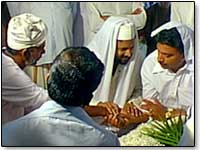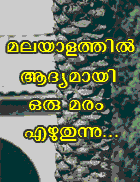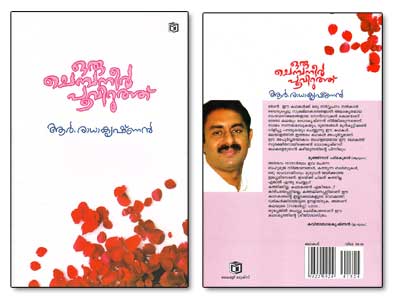26 February 2009
ഗാനതര്പ്പണം (ഹൊയ്, ഹൊയ്)
മലയാളത്തിലെ പാട്ടുകള്ക്ക് വായ്ക്കരിയിടുന്ന ഈ നൂതന ഗാന നിരൂപണ പരിപാടിയിലേക്കു സ്വാഗതം. വയലാര് രാമവര്മ മുതല് അനില് പനച്ചൂരാന് വരെയുള്ള ഗാന രചയിതാക്കളുടെ ഗാനങ്ങള് പരിശോധിച്ചും വിമര്ശിച്ചും ഞാന് തളര്ന്നിരിക്കുന്നു. ഈ കവികള്ക്കൊന്നും ഇവരുടെ പേരില് പോലും ഒരു വൃത്തമോ അലങ്കാരമോ കാത്തു സൂക്ഷിക്കാനോ ആശയത്തിന്റെ കാര്യത്തില് സ്ഥിരത പുലര്ത്താനോ കഴിഞ്ഞിട്ടില്ല എന്നതോര്ക്കണം. ഉദാഹരണത്തിന് വയലാര് രാമവര്മയുടെ പേര് നോക്കുക. വയലാണോ ആറാണോ എന്ന കാര്യത്തി ല്പ്പോലും അദ്ദേഹത്തിനു തീര്ച്ചയില്ല. രാമവര്മ എന്നതില് പ്രാസം വന്നിട്ടുണ്ടെങ്കിലും വ്യുല്പത്തി ഇല്ല. അതു പോലെ ഗിരീഷ് പുത്തന്ചേരി. ചേരി എന്നു പറഞ്ഞാല് അത് ചേരിയാണ്. അതു പിന്നെ പുത്തനാണോ പഴയതാണോ എന്നൊന്നും ഒരു വിശേഷണത്തിന്റെ ആവശ്യമില്ല. ഇങ്ങനെ യുള്ളവന്മാര് എഴുതുന്ന പാട്ടുകളെക്കുറിച്ച് പറയാതിരി ക്കുന്നതായി രിക്കുമല്ലോ ഭേദം.
സിനിമകളെക്കുറിച്ച് അഭിപ്രായം പറയേണ്ട കാര്യമില്ലെങ്കിലും സിനിമകളുടെ പേരിലും ഒരു കാവ്യഭംഗി ആവശ്യമാ ണെന്നാണ് എന്റെ അഭിപ്രായം. ഇപ്പോഴത്തെ സിനിമകളുടെ പേരുകള്ക്ക് കാവ്യ ഭംഗി ഇല്ലെന്നു മാത്രമല്ല ചിലതിനൊന്നും പേരു പോലുമില്ല. ഉദാഹരണത്തിന് ഈയിടെ ഇറങ്ങിയ തിരക്കഥ എന്ന സിനിമ. ആ സിനിമയെപ്പറ്റി പറയുമ്പോള് ഒരു സിനിമ എന്ന നിലയില് അതൊരു പരാജയ മാണെന്ന ഏറ്റു പറച്ചില് തന്നെയാണ് അതിന്റെ പേര്. ഏതു സിനിമയുടെയും അടിസ്ഥാനം അതിന്റെ തിരക്കഥയാണ്. ആ തിരക്കഥയ്ക്കു നല്കുന്ന പേര് തന്നെയാണ് സിനിമയുടെയും പേരായി മാറുന്നത്. ഈ സിനിമയ്ക്ക് ഒരു പേരു കണ്ടെത്താന് കഴിയാത്ത ഇതിന്റെ അണിയറക്കാര് ഇതിനു സിനിമ എന്നു പേരിട്ടാല് മതിയായിരുന്നു. എന്തിനാണ് ഇവര് തിരക്കഥ എന്നു പേരിട്ടതെന്നു മനസ്സിലാവുന്നില്ല. അങ്ങനെയെങ്കില് ക്യാമറ എന്നോ ക്രെയിന് എന്നോ ട്രോളി എന്നോ ഒക്കെ ഇടാമായിരുന്നു. പഴയ ഗാന രചയിതാക്കള് ഒക്കെ നല്ലവരും പുതിയ ആളുകളൊക്കെ മോശവും ആണെന്നൊന്നും ഞാന് പറയില്ല. എങ്കിലും വയലാറും ഭാസ്കരന് മാഷും ഒക്കെ എഴുതിയിട്ടുള്ളതു പോലൊക്കെ എഴുതാന് ഇന്നാര്ക്കാണ് വിവരമുള്ളത്. ചിലരാകട്ടെ വരികളില് വലിയ അക്രമങ്ങളാണ് എഴുതി വയ്ക്കുന്നത്. ഉദാഹരണത്തിന് ഞാന് ഗന്ധര്വ്വന് എന്ന സിനിമയില് ഒരു ഗാനമുണ്ട്. വളരെ നല്ല ഗാനമാണ് എത്ര മനോഹരമായ വരികളാണ് എന്ന് എന്നോടു ചിലര് പറഞ്ഞതു കൊണ്ടാണ് ഇപ്പോള് ഞാനതിനെക്കുറിച്ചു പറയുന്നത്. അതിന്റെ തുടക്കം ഇങ്ങനെയാണ്- പാലപ്പൂവേ നിന് തിരു മംഗല്യത്താലി തരൂ മകരനിലാവേ നീ നിന് നീഹാരത്തോണി തരൂ.. ഈ വരികളിലുള്ളത് കവിതയും സൌന്ദര്യവുമൊന്നുമല്ല അക്രമവും അരാജകത്വുമാണ്. പാലപ്പൂവേ നിന്തിരു മംഗല്യത്താലി തരൂ എന്നാണ് കവി പറയുന്നത്. നല്ല ഭാഷയില് പറഞ്ഞാല് പാലപ്പൂവിനോട് സ്വന്തം കെട്ടുതാലി പൊട്ടിച്ചു തരാന് ആവശ്യപ്പെടുകയാണ്. ഒരു പെണ്ണിനോട് കെട്ടുതാലി പൊട്ടിച്ചു തരാന് ആവശ്യപ്പെടുന്നതില് എന്തു കവിതയാണുള്ളത്. അതു കൊണ്ട് തീരുന്നില്ല. മകര നിലാവിനോട് നീ നിന് നീഹാരത്തോണി തരൂ എന്നാണ് പറയുന്നത്. നീഹാരം എന്നു പറഞ്ഞാല് നീരില് നിന്നുള്ള ആഹാരമാണ്. അതായത് വെള്ളത്തില് നിന്ന് വയറ്റിപ്പിഴപ്പിനുള്ള വക ഉണ്ടാക്കുന്നയാവാണ് മകരനിലാവ് എന്നു വ്യക്തം. എവിടെയോ കടത്തു സര്വീസ് നടത്തി ജീവിക്കുന്ന മകര നിലാവിനോട് അദ്ദേഹത്തിന്റെ ജീവിത മാര്ഗമായ ആ കടത്തു തോണി ഇങ്ങോട്ടു തരൂ എന്നാണ് കവി ആവശ്യപ്പെടുന്നത്. അധ്വാനിച്ചു ജീവിക്കുന്ന അടിസ്ഥാന വര്ഗത്തിന്റെ വയറ്റത്തടി ക്കുമെന്നുള്ള സൂചനയാണ് കവി ഈ വരിയിലൂടെ നല്കുന്നത്. ഇങ്ങനെ പെണ്ണുങ്ങളുടെ കെട്ടുതാലി പൊട്ടിച്ചും പാവങ്ങളുടെ കഞ്ഞി കുടി മുട്ടിച്ചും എഴുതുന്ന വരികളെ എങ്ങനെയാണ് കവിതയെന്നും ഗാനമെന്നും വിളിക്കുന്നത് എന്നെനിക്കു മനസ്സിലാവുന്നില്ല. ചലച്ചിത്ര ഗാന ശാഖയില് മാത്രമല്ല, ഗാനങ്ങള്ക്ക് എല്ലായിടത്തും തകര്ച്ച സംഭവിച്ചിട്ടുണ്ട്. ഭക്തി ഗാനങ്ങള്ക്കു പോലും ഒരര്ത്ഥവുമി ല്ലാതായിട്ടുണ്ട്. അടുത്ത കാലത്ത് ഏറ്റവും ഹിറ്റായ ഒരു ക്രിസ്തീയ ഭക്തി ഗാനമുണ്ട്. ഇസ്രയേലില് നാഥനായി വാഴുമേക ദൈവം സത്യ ജീവ മാര്ഗമാണു ദൈവം... ഗാനത്തെ ക്കുറിച്ചൊരു നിരൂപണ ത്തിനൊന്നും ഞാന് മുതിരുന്നില്ല. ഇതിന്റെ ആദ്യ രണ്ടു വരികള് മാത്രം ശ്രദ്ധിച്ചാല് മതി. ഇസ്രയേലില് നാഥനായി വാഴുമേക ദൈവം - ഏക ദൈവം ഇസ്രയേലിന്റെ നാഥനായാണ് വാഴുന്നത്. പലസ്തീന്കാരുടെയും ചൈനക്കാരുടെയും പോട്ടെ പത്തു നൂറു കോടി ഇന്ത്യാക്കാരുടെയും കാര്യം നോക്കാന് ദൈവത്തെ കിട്ടില്ല എന്നാണ് അതു നല്കുന്ന സൂചന. അതു പോലെ തന്നെ അടുത്ത വരിയില് പറയുന്നു - സത്യ ജീവ മാര്ഗമാണു ദൈവം - ഇത് കവി അറിഞ്ഞു കൊണ്ടെഴു തിയതാണോ അതോ അബദ്ധത്തില് സത്യം പറഞ്ഞു പോയതാണോ എന്നറിയില്ല. സത്യത്തില് ദൈവം ഒരു ജീവിത മാര്ഗമാണ് എന്നാണ് ഈ വരിയില് പറയുന്നത്. മറ്റേതെങ്കിലും ഗാനത്തി ലായിരുന്നെങ്കില് ഇതിനെ നല്ലൊരു സാമൂഹിക വിമര്ശനമായി കാണാമായിരുന്നു. എങ്കിലും ഇസ്രയേലിലെ കാര്യം പറഞ്ഞിട്ട് നേരേ നമ്മുടെ നാട്ടിലെ വചന പ്രഘോഷണ ക്കാരെക്കുറിച്ച് പറഞ്ഞതില് ഔചിത്യ ക്കുറവുണ്ട്. ഞാനിത്രയൊക്കെ പറയുമ്പോള് നിങ്ങളൊക്കെ ചോദിക്കുന്ന ഒരു ചോദ്യമുണ്ട് ഈ തെറ്റുകളൊന്നും ഇല്ലാതെ ഒരു ഗാനം എഴുതി ക്കാണിക്കാന് ചുണയുണ്ടോ എന്ന്. ഇതാ അത്തരത്തില് അടുത്ത കാലത്തിറങ്ങിയ അബണ്ട ജടിലമായ ഒരു ഗാനം തെറ്റുകളൊ ന്നുമില്ലാതെ ഞാന് മാറ്റിയൈ ഴുതിയിരിക്കുന്നതു കൂടി ആസ്വദിക്കൂ. പാലപ്പൂവിതളില് എന്ന തിരക്കഥ എന്ന സിനിമയിലെ ഗാനമാണ് അര്ത്ഥ സമ്പുഷ്ടമായി ഞാന് പുനര്സൃഷ്ടി ച്ചിരിക്കുന്നത്. ആദ്യത്തെ വരികള് ശ്രദ്ധിച്ച ശേഷം എന്തെങ്കിലും തകരാറുണ്ടോ എന്നു പറയുക. ഹൊയ് ഹൊയ് ഹൊയ് ഹൊയ് ..ഹൊയ്.. ഹൊയ് ഹൊയ് ഹൊയ് ഹൊയ് ..ഹൊയ്.. പാലപ്പൂവിന്റെ ഇതളിലും വെണ്ണിലാവിന്റെ പുഴയിലും ലാസ്യ ഭാവത്തോടെ അടുത്തേക്കു വരികയാണ് സുരഭില രാത്രി അനുരാഗമുള്ളതു കൊണ്ട് പൂവിട്ട മരക്കൊമ്പുകളില് ശ്രുതിപോലെ പൊഴിയുന്ന ഇളം മഞ്ഞലയുടെ കാതുകളില് കേള്ക്കുന്നത് നിന്റെ സ്വരമാണ്.. ഹൊയ് ഹൊയ് ഹൊയ് ഹൊയ് ..ഹൊയ്.. ഇതാണ് കവിത. ഇതില് എവിടെയും ഒരര്ത്ഥ ശങ്ക ആര്ക്കെങ്കിലു മുണ്ടാവുമെന്നു തോന്നുന്നില്ല. ലാ,ലാ,ലാ എന്നതിനു പകരമാണ് ഞാന് ഹൊയ് ഹൊയ് ചേര്ത്തത്. ലാ, ലാ,ലാ കൃത്രിമമാണ്. അതിനു പ്രത്യേകിച്ച് അര്ത്ഥമൊന്നുമില്ല. എന്നാല് ഹൊയ് ഹൊയ് എന്നു പറയുന്നത് മലയാളിയുടെ നാടന്പാട്ടു സങ്കല്പത്തിന്റെ ശ്രുതി സങ്കേതങ്ങളി ലൊന്നാണ്. ഇന്നത്തെ എപ്പിഡോസ് ഇവിടെ അവസാനിക്കുന്നു, വീണ്ടും അടുത്തയാഴ്ച. - ബെര്ളി തോമസ് Labels: berly-thomas |
14 February 2009
Dowry in Kerala- A bane of womanhood Haseena sits on the smudged floor at a hospital bed that runs with the help of local Panchayat. She cannot lie down because the skins on both her back and lower abdomen are blistered with severe burns, cruelly inflicted by her husband. The reason ?. Haseena’s parents failed to meet their promise of endowing the remaining portion of dowry to her husband. But then Haseena is not alone in being victimized to such unscrupulous practice that is still prevalent in India, and particularly Kerala. Revathi, commerce graduate had a job at private company in Cochin when she go married to Raghavan, an automobile work shop owner . Customarily, she tied her knots with him in an arranged marriage in which parents from both the family sanctioned their union. Ironically , Raghavan still demanded a hefty dowry. Revathi’s father who is a mason did not have the means to raise the 2 lakhs he had demanded and the only option he had was to mortgage his small home in a 3 cents plot. Ravath’s father somehow raised Rs1,50000, but was unable to secure the remaining Rs 50000. And three months after the wedding, Raghavan was a changed man. He threatened Ravethi with a divorce petition unless the balance amount is settled . Soon he started physically abusing her, often inflicting severe wounds with kitchen knives. Ravathi suffered silently for almost two years before returning to her parents. Now she is raising her daughter all by herself. Luckly she still keeps her job. The incident may pose a prominent question. Why did Ravathi or her family yielded to such a culpable demand in the first place? “ There were more than a dozen of wedding proposals that had come to us before Revathi was married off. Almost all of them demanded dowries at varying proportions. Among them were two unemployed youths who promised the dowry money would be spent on some business. We could not wait any longer since our daughter was getting past her appropriate age for marriage. Do you honestly think that a good Samaritan would have turned up to marry my daughter without putting forward any demand. ” Dowry has always been an perennial curse that keeps thrusting its sharp nails into the existence of most families in Kerala who raise daughters. An evil practice as it surely is , the time is way to past to put an end to this social anathema. But it has never been so easy. There has been isolated voices that raised in protest and so were a number campaigns to create awareness. Most outstandingly, there were few brave women who stood against those wicked men who considered marriage as way of gaining financial needs. It still comes as a relief , some socially conscious Keralites in the Gulf are coming forward to challenge the practice of dowry. Recently, an over seas Anti -dowry forum in Dubai based held to mark a commemoration get-together to honor founder president of the All India Anti-dowry movement late Mr. Mohammed Ali Padiyath who was a pioneer in running many campaigns against the dowry practice in Kerala . Padiyath was instrumental in facilitating a mass wedding in Kerala for many young couples hailing from poor families in Kerala. K.A. Jabbari is another senior member of “Vayanakootam” ( a voluntary Socio cultural literary forum) in Dubai & Kerala and the Mg. editor of Salafi times free journal who is tirelessly campaigning against dowry. The path to realizing a society that is free from materialistic demands is still way to far away. But the relentless work of those who believe in the goodness of humanity cannot go unheard and the benefit that comes along will be a boon to thousands upon thousands of women living in Kerala. - Mohammed Sageer Labels: sageer 1 Comments:
Links to this post: |




































0 Comments:
Post a Comment
Links to this post:
Create a Link
« ആദ്യ പേജിലേക്ക്